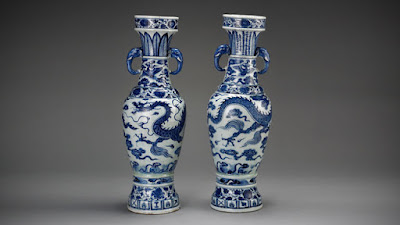Chinese Art Market Is now Bigger than the USA and Growing
 |
| Chinese Dissident Artist Ai Weiwei |
Chinese Art Market Is now Bigger than the USA and Growing
Ancient Through Modern Art in China are all in Demand
Its no secret that over the last 15 years demand inside China for fine art, Asian art and antiques has grown exponentially. According to TEFAF Maastricht , the most important fine art fair in the world, Chinese consumers are now buying 30% of the worlds art nudging the United States into second place for the first time with 29% of the market. Results from other auction house's such as Christie's and Sotheby's as well as China's own art auction firms "Poly" and "Guardian" confirm the vitality of the Chinese and the overall Asian economy. Recent auctions in Hong Kong have grossed over 300 million dollars for Asian works of Art alone. These numbers include a significant results for very significant sums paid for Contemporary and 20th C. Chinese art as well. So our saying the Chinese Art market is now bigger than the USA and growing.
As with all markets, the prices for Chinese art on all levels will in time reach a maturation level. Overpriced things will fall back in value and others will rise as appreciation for the overlooked areas grow. Its a normal and healthy process.
Changes in China Have Occurred on Many Levels
This is significant as it confirms several things.- First, after decades of brutal repression under Mao the cultural resilience of the Chinese people has enabled them to rise to the opportunity of a Free Market Capitalism, compete and prosper. Average income in China has climbed more than 250% in the last 10 years.
- Second, the average Chinese worker has a savings rate of more than 22% of income, as opposed to Americans who linger between 4% and negative numbers.
- The Chinese Government IS changing, albeit slowly on many levels for the betterment of its people. The huge irony is, China's Communist Government is now being funded by it's own internal Capitalistic engine.
- People inside China are becoming wealthy in amounts similar to the wealthy in the West. Though the Chinese worker still earns less than their counterparts in the USA and the EU they are catching up and enjoying a better quality of life. Most importantly, they feel as though they now have a chance to prosper.
- High demand for Art and Antiques is an excellent indicator of how well an economy is doing. It's the kind of thing people put money into when they have their other basic needs met and feel confident enough to tie up significant capital in none income producing products.
- The Chinese Communists, who under Mao, discouraged and actually destroyed cultural art and objects to demonstrate their resolve in moving the nation away from decadence and what they had viewed as the symbols of in-equality and the cause of repression by the Imperial Families of the past.
 |
| Modern Pen and Ink Landscape by Li Huayi |
China has an artistic history going back thousands of years which can and does tell a story of its cultural evolution, ebb and flow of politics and economics. The arts of China reflect those changes every inch of the way. The Chinese people are now freer than they have ever been to learn and understand from their own, very long history as never before on a broad scale.
Today in China the inevitable is happening, the power of political art has come to to the forefront and is reaching a worldwide audience. Much has been said in the Press about dissident Chinese artists such as Ai Weiwei, who has managed to use his artistic brilliance to effectively speak out against the Chinese Government. Weiwei is now part of a long world wide historical list of people who through the creative fields are affecting change. Its been happening like this for centuries, from Africa, to Russia, Europe, Middle East and America.
The presence of "Artistic Movements" ARE a sign of a nations intellectual health and often leads to breakthroughs on many levels. The inevitable politicization of art may have bumps along the way, with terrible consequences for those involved, but it cannot be stopped. Something , no doubt the current leaders in China know to be true but are not yet willing to deal with in an enlightened way. Perhaps the new Government there will nudge ahead after the new year.


Comments
Post a Comment
If you have any questions or comments please send us a message. Or use the Contact Us tab at the top of the page.